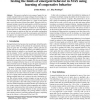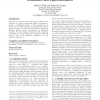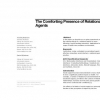1310 search results - page 32 / 262 » Configuring social agents |
ECAI
2006
Springer
13 years 11 months ago
2006
Springer
Abstract. We present a method to test a group of agents for (unwanted) emergent behavior by using techniques from learning of cooperative behavior. The general idea is to mimick us...
ATAL
2003
Springer
14 years 27 days ago
2003
Springer
The term social navigation refers to the process of seeking social interaction as a source of navigational support. In this paper we present a computational model of social naviga...
CHI
2006
ACM
14 years 8 months ago
2006
ACM
In this paper we describe an on-going experiment on the calming effects of a relational agent on users following a social bonding interaction. Applications to a range of health ca...
JAIR
2008
13 years 7 months ago
2008
In the efficient social choice problem, the goal is to assign values, subject to side constraints, to a set of variables to maximize the total utility across a population of agent...
EXPERT
2007
13 years 7 months ago
2007
Agent-based social simulation (with multi-agent systems), which is an important aspect of social computing, can benefit from incorporating cognitive architectures, as they provid...



